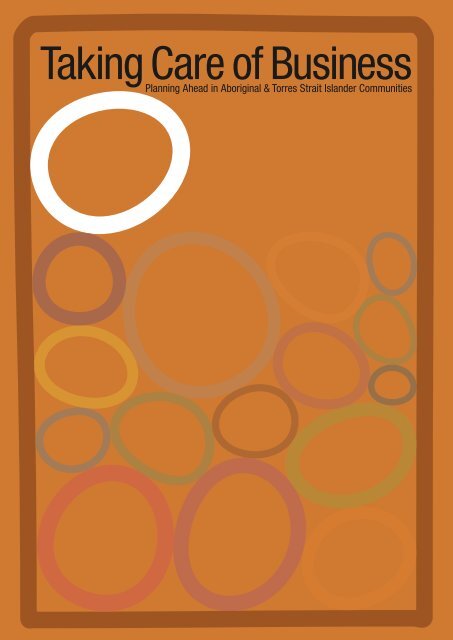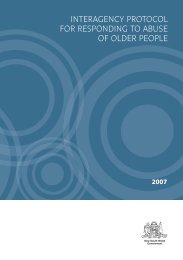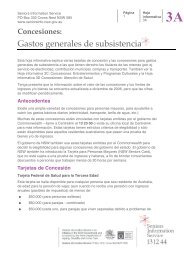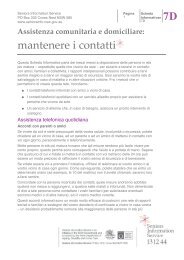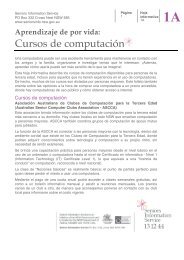Taking care of business (A4) (PDF) - Seniors Information Service
Taking care of business (A4) (PDF) - Seniors Information Service
Taking care of business (A4) (PDF) - Seniors Information Service
- No tags were found...
You also want an ePaper? Increase the reach of your titles
YUMPU automatically turns print PDFs into web optimized ePapers that Google loves.
<strong>Taking</strong> Care <strong>of</strong> BusinessPlanning Ahead in Aboriginal & Torres Strait Islander Communities
<strong>Taking</strong> Care <strong>of</strong> BusinessPlanning Ahead in Aboriginal andTorres Strait Islander Communities
This booklet is part <strong>of</strong> a kit developed to help people talk about planningahead, so they are prepared for times when they are not able to makedecisions for themselves. There is also contact information for local andState-wide services that can provide further advice.The kit is based on information produced by:• The Benevolent Society• Public Trustee NSW• The Guardianship Tribunal• Office <strong>of</strong> Fair Trading• Centrelink.DisclaimerThis is a plain English guide. Great <strong>care</strong> has been taken to make it asaccurate and relevant as possible. However, it should not be relied onas the only source <strong>of</strong> advice when making decisions that could affect aperson’s rights or responsibilities.The NSW Department <strong>of</strong> Ageing, Disability and Home Care cannotaccept responsibility for the ways the document is used. Pr<strong>of</strong>essionaladvice should be obtained when making decisions about how to use theinformation contained in it.
ContentsIntroduction 5Making a will 8Funeral funds 10Making decisions about my health and lifestyle 12Other decisions about my health 14Making decisions about my finances 16Where can I get legal help? 20Getting more information 21Community legal centres 22Glossary <strong>of</strong> terms 23Planning Ahead in Aboriginal and Torres Strait Islander Communities
IntroductionThis booklet provides information designed to help members <strong>of</strong> Aboriginal and TorresStrait Islander communities plan ahead, so they are prepared for times when theyare not able to make decisions for themselves. The booklet aims to help Aboriginalpeople to make their wishes known about their personal, health and financial affairs.It suggests ways they can make arrangements for a trusted relative or friend to makedecisions on their behalf if the need arises.The authors have consulted organisations providing aged <strong>care</strong> and legal advice topeople <strong>of</strong> Aboriginal and Torres Strait Islander heritage, and have met with members<strong>of</strong> Aboriginal communities in six locations in New South Wales. Issues raised in theconsultations are summarised below.Older Aboriginal people understood the need for families to talk about, and makeplans for, a time when they might not be able to make decisions for themselves.However, it was acknowledged that Aboriginal people have <strong>of</strong>ten been reluctantto discuss these matters. Some people said it was not part <strong>of</strong> Aboriginal culture toplan ahead, but not everyone agreed with this view.Reasons people gave for not planning ahead included:• We’ve got nothing, so there’s nothing to plan ahead for. Having few materialassets was the most commonly cited reason for lack <strong>of</strong> interest in making awill and more generally not planning ahead.• Some people saw it as important to be able to look after yourself withoutasking for help. Others said there was a sense <strong>of</strong> shame in having to ask forhelp, particularly if they had to put a loved one into <strong>care</strong>.Planning Ahead in Aboriginal and Torres Strait Islander Communities
• Some people said there was an understanding in their family that one familymember would have the duty <strong>of</strong> taking <strong>care</strong> <strong>of</strong> an older person should theirhealth deteriorate and so it was unnecessary to formalise the arrangement.People in communities where families live in close proximity were more likelyto express this view.• Dealing with legal and financial language and complex forms was alienatingfor most people, and this made them reluctant to deal with the legal system.Overall, Aboriginal people consulted for this project had little understanding <strong>of</strong>the situations that require legal authority for someone to act on their behalf.Very few participants in the focus groups had made a will. Reasons cited included:being alienated by legal jargon; not having any assets to leave; the cost <strong>of</strong> making awill; and the difficulty <strong>of</strong> getting a will made (including transport in remote communities).There was a lack <strong>of</strong> clarity about how to make a valid will, about the function <strong>of</strong> anexecutor and about whether a will can be contested.A practical way <strong>of</strong> planning ahead discussed in the consultations was to join a funeralfund. People saw this as one way they could relieve the family <strong>of</strong> financial concernsduring a time <strong>of</strong> grieving. Many people consulted were either currently paying into afuneral fund or actively considering doing so.Poorer health and higher levels <strong>of</strong> disability in Indigenous communities make healtha critical planning issue. Health-related issues raised were:• Increasing numbers <strong>of</strong> Aboriginal people are choosing to die at home; theyand their families want to know what palliative <strong>care</strong> support is available andhow they can make their wishes known.<strong>Taking</strong> Care <strong>of</strong> Business• Some people wanted information on the early signs <strong>of</strong> dementia and how tobroach the subject without causing anxiety.
• Participants in the consultations talked <strong>of</strong> the shame and anxiety they,or others they know, had faced in having to put a family member into anursing home. NSW has only two Indigenous residential aged <strong>care</strong> services(in Nowra and Kempsey). Although staff from some aged <strong>care</strong> servicesundertake cultural awareness training, there is still concern in Aboriginalcommunities about the lack <strong>of</strong> cultural understanding in mainstream services.Because Aboriginal and Torres Strait Islander people tend to have poorer health andmore disability than non-Indigenous Australians, it may be better in the Indigenouscontext to emphasise planning ahead for possible incapacity rather than for “old age”.The information in this booklet may become relevant earlier in Indigenous communitiesthan in mainstream contexts. As one person put it: “the whole family should be talkingabout these things.”A word about language:Although this booklet is intended for the use <strong>of</strong> peopleproviding services to Aboriginal or Torres Strait Islanderpeople, it mostly addresses the Aboriginal or Torres StraitIslander person directly. This is to avoid repeated cumbersomereferences to “Aboriginal and Torres Strait Islander clients”or “Aboriginal and Torres Strait Islander people using yourservices”. It may also mean that the book is directly accessibleto the people whom it is meant to help.Planning Ahead in Aboriginal and Torres Strait Islander Communities
Making a willA will is a legal document that says who you wish to leave your money and belongingsto, after you die. It also helps your friends and family know <strong>of</strong> any special funeralarrangements you want.Why do I need a will?Most people agree that having a will is a good idea. If you pass away without havingmade a will, an administrator will be appointed to decide how your money andbelongings will be divided among your family and the government. This means thatthe people you wanted to get your things may not get them.Who should make a will?Every one over 18 who is <strong>of</strong> sound mind should make a will. It is particularly importantto make a will after you get married or divorced, or if you begin a de-facto relationship.How do I make a will?Making a will can be easy and it doesn’t have to be expensive. A will can be short orlong and it can use simple and clear language. Some <strong>of</strong> the things you need to thinkabout are:• Who do you want to name as a beneficiary? (A beneficiary is a person whoreceives something in your will.) If you want more than one beneficiary, whichassets do you want each <strong>of</strong> them to receive?• Are any <strong>of</strong> your beneficiaries minors (under 18 years old)? The law stopsminors from inheriting anything until they reach 18 years <strong>of</strong> age. Your will canmake special arrangements for them.<strong>Taking</strong> Care <strong>of</strong> Business• Who do you want as your executor? (The executor is the person responsiblefor administering your estate until your assets are distributed to the beneficiaries.)Your executor will have a lot <strong>of</strong> responsibility so if you choose a friend orfamily member make sure they understand what they will have to do. Somepeople choose a pr<strong>of</strong>essional to help. When the Public Trustee NSW isappointed as executor or co-executor, they prepare and update the will free<strong>of</strong> charge. However, they charge for their work in administering the estate.Can I change my will?You can change your will as <strong>of</strong>ten as you want. It is a good idea to review your willwhen things in your life change.
Where should I keep my will?You should keep your will in a safe place, but where it can be found after your death.It’s a good idea to tell someone where your will is stored as if <strong>of</strong>ten happens thatfamily and friends know that a person made a will but they cannot find it.If you make your will with the Public Trustee’s <strong>of</strong>fice, the original is held free <strong>of</strong> chargein their safe and you receive a copy.GraceGrace is 70. Two years ago she suffered a stroke. Her 51 year olddaughter Lyn now lives with her and <strong>care</strong>s for her full time.Grace owns her own home in a small country town. She and herhusband bought it years ago when their children were small. Gracealso has a few odds and ends that are <strong>of</strong> value to her that she wouldlike to leave to specific family members.While still very alert Grace has noticed she is getting a little forgetfuland she has also noticed that the effects <strong>of</strong> the stroke are taking theirtoll on her body.While she is still alert and <strong>of</strong> sound mind Grace decides to put herwill together so that her children and grandchildren are clear aboutwho gets the house and other important items. Last time she saw herdoctor she asked him if he could give her some information abouthow to make a will. He told her to talk to the local Community LegalCentre who could help her.Grace has now made a will and had it signed by an appropriatewitness. She asked her eldest son to be the executor <strong>of</strong> her will andhe agreed.Grace feels at peace. If anything happens to her, her affairs are inorder and someone she trusts will take <strong>care</strong> <strong>of</strong> everything.Planning Ahead in Aboriginal and Torres Strait Islander Communities
Funeral fundsWe’ve seen so many people in our community pass away where the family foundit hard to find the money to pay for the funeral.At the community consultations with Aboriginal people in NSW, many peoplesaid that paying into a funeral fund was a way they could plan to relieve their family<strong>of</strong> the financial burden <strong>of</strong> their passing.There are a number <strong>of</strong> ways to make advance payments towards the cost <strong>of</strong>your funeral:• You can make small regular payments to a funeral fund. Contributions tosome funds go towards payment for a funeral service with a particularfuneral director. Others provide a cash benefit which can be used to paythe funeral director you choose.• You can have a pre-paid funeral. You select a funeral director, make decisionsabout the type <strong>of</strong> funeral you would like and then pay for that funeral at today’sprices, usually in a lump sum or a few large instalments.The Office <strong>of</strong> Fair Trading regulates these funds. You can phone them on 1800 502042 for a list <strong>of</strong> registered funds.Did you know?Some airlines provide a compassionate airfare for passengers flying to attend afuneral. They may have special conditions such as needing to see a letter from afuneral director or doctor.<strong>Taking</strong> Care <strong>of</strong> Business10
Simon and his familySimon is 32 and recently married. He recently lost his mother tocancer. When his mother passed away it was a huge financial strainon the family. None <strong>of</strong> his brothers or sisters had much money toput towards the funeral and his dad and mum had used up most<strong>of</strong> their savings when they had to travel to the city for his mother’streatments. Simon and his wife Laura had a little bit <strong>of</strong> money savedbut not enough to cover the whole funeral. So Simon’s dad endedup having to take out a small loan to cover the rest <strong>of</strong> the funeralexpenses which the whole family are helping to pay <strong>of</strong>f.A few weeks after the funeral a close friend <strong>of</strong> Simon’s, who knewhow expensive the funeral had been and the strain it had put onthe entire family, suggested that they look into a funeral fund forthemselves and other members <strong>of</strong> the family.Simon and Laura thought it was a fantastic idea. They had seen anad on TV and they had heard that a local Aboriginal organisation<strong>of</strong>fered a fund. They looked into both and chose the one that suitedthem. They also encouraged other family members to join. Simon’sdad was one <strong>of</strong> the first to sign up.Simon and Laura now have peace <strong>of</strong> mind. If anything were tohappen to them they will not put a financial strain on the rest <strong>of</strong> thefamily. Their funerals will be taken <strong>care</strong> <strong>of</strong> and people can grieveinstead <strong>of</strong> having to worry about money.Planning Ahead in Aboriginal and Torres Strait Islander Communities11
Making decisions about my healthand lifestyleSometimes a person is not able to make decisions about their own life. This could bebecause <strong>of</strong> dementia, a brain injury or severe physical injury. You can arrange for afamily member or friend to make decisions on your behalf just in case this happensto you.Often we have a family member in mind who can take on the role <strong>of</strong> making thesedecisions. We have told them what we would like to happen to us if we start to loseour memory or have a bad accident or illness and can’t make our own decisions.It can make things much easier if we make our wishes clear to everyone. A way <strong>of</strong>doing this is to appoint an enduring guardian.An enduring guardian is someone you appoint to make personal and health decisionson your behalf when you are not capable <strong>of</strong> doing it for yourself. You can decide whatdecisions you want your enduring guardian to make. You can also appoint more thanone person if you want.The types <strong>of</strong> decisions (called “functions”) you might ask your enduring guardian tomake are:• to decide where you live• to consent to treatment prescribed by your doctor• to decide what personal services you receive (such as Meals onWheels, Home Care)• to decide what medical or dental treatment you receive.<strong>Taking</strong> Care <strong>of</strong> BusinessYou can tell your guardian how you want them to go about carrying out thesedirections. For example, you can tell them that you’d like them to talk to anothermember <strong>of</strong> your family about decisions whenever possible.If something goes wrong with the appointment <strong>of</strong> the enduring guardian (eg. if theyget sick or are not acting in the best interests <strong>of</strong> the person) the Guardianship Tribunalcan review the appointment and change it to protect the person with the disability.What decisions can’t an enduring guardian make?There are some decisions that enduring guardians can’t make for you. They can’tmanage your finances, make a will for you, vote on your behalf, or consent to yougetting married.12
How do I appoint an enduring guardian?You need to talk to the person you have chosen to be your enduring guardian andmake sure they are willing to take on the responsibility and that they understand yourwishes. It is also a good idea to talk to other important people in your life about this.You need to fill in an Appointment <strong>of</strong> an Enduring Guardian form and have a solicitor,barrister or Registrar <strong>of</strong> the Local Court witness you and your enduring guardiansigning the form. Keep the form in a safe place and tell someone where it is. Give acopy to your enduring guardian.You can get more information and an Appointment <strong>of</strong> Enduring Guardian form fromthe Office <strong>of</strong> the Public Guardian or the Guardianship Tribunal. (See page 21.)The appointment <strong>of</strong> your enduring guardian will only take effect if you are no longerable to make your own personal or lifestyle decisions. Your guardian should talk toyour doctor about your capacity to make decisions before acting on your behalf.EllenEllen has recently been diagnosed with the early signs <strong>of</strong> dementia,which has made her have a good think about her future.Ellen always knew her eldest daughter would take <strong>care</strong> <strong>of</strong> everythingif she could no longer make decisions for herself or <strong>care</strong> for herself.She had talked to her daughter about what she wants on many occasions.Ellen has a close friend Lois who also suffers from dementia and is atthe point where she can no longer <strong>care</strong> for herself. Lois thought herdaughter would take <strong>care</strong> <strong>of</strong> everything but when her memory got sobad she couldn’t do anything for herself anymore the family startedarguing and challenged the daughter and her decisions. It caused allsorts <strong>of</strong> mess and now Ellen doesn’t want the same thing to happento her when she can no longer function properly. She asked aroundabout how she can prevent an uncomfortable situation and make sureher daughter is the only one who can make decisions for her.Planning Ahead in Aboriginal and Torres Strait Islander CommunitiesEllen made her daughter her enduring guardian. She talked it allthrough with her daughter and made sure her daughter is clear on herwishes. She then had the Appointment <strong>of</strong> Enduring Guardian formedsigned by an appropriate witness.13
Other decisions about my healthOne thing that’s important to me is to be able to die at home where I have my familyaround me. I want to know what support I can get from doctors and the heath system.Some people have got strong ideas about what they’d like to happen to them if theyget ill and can’t communicate their wishes, or if they lose the ability to make decisionsfor themselves. Other people don’t want to think about these things and would ratherleave them up to their family or <strong>care</strong>r. The important thing is to talk with your familyand doctor about what you want to happen. Some people choose to write down theirwishes in an advance <strong>care</strong> directive.An advance <strong>care</strong> directive (sometimes called a living will) is a way <strong>of</strong> recordingyour wishes or instructions for the future for doctors and health <strong>care</strong> workers. It’s onlyused when you are unable to communicate or have lost the ability to make decisionsfor yourself.There is no special form for that you have to use. You can write down your wishesin a letter. The NSW Department <strong>of</strong> Health has published recommendations on thebest way to write an advance <strong>care</strong> directive. An advance <strong>care</strong> directive should followthese four principles:• It needs to be specific: it can include your preferences for treatment fora health condition you have now or one you may develop in the future.• It needs to be kept current: it is important to review your advance <strong>care</strong>directive regularly or if there is a big change in your health.<strong>Taking</strong> Care <strong>of</strong> Business• You must be mentally competent: you can only make an advance <strong>care</strong>directive while you still have the mental ability to understand thechoices you are making,• It is a good idea to have it witnessed.14
LeanneLeanne is 35 years old and has uncontrolled diabetes. She is marriedwith three children – a five year old, a two year old and a six-montholdbaby.Having her last baby really put a strain on her kidneys. With hersugars all over the place, the doctor has said it won’t be long, maybeanother three years, and she’ll be on dialysis. He’s also warned therecould be other complications like strokes and heart attacks.Leanne and her husband have decided it’s important to look at theirfamily’s future and how Leanne’s health could affect them.When they told their doctor <strong>of</strong> their concerns he talked to them aboutan advance <strong>care</strong> directive (sometimes called a living will). He toldthem that Leanne could say how she would like to be treated if a timecame when she couldn’t make those decisions herself.Once Leanne and her husband put the advance <strong>care</strong> directivetogether they had it signed by an appropriate witness.Knowing that her husband and doctor are aware <strong>of</strong> what kind <strong>of</strong>health <strong>care</strong> she wants in the future should she become unable tomake decisions for herself makes Leanne feel at ease. She knowsthat for now she can just focus on her children and whatever happenswith her health in the future is already taken <strong>care</strong> <strong>of</strong>.Planning Ahead in Aboriginal and Torres Strait Islander Communities15
Making decisions about my financesA power <strong>of</strong> attorney is a document you can sign to appoint another person (called yourattorney) to look after your financial affairs if you aren’t able to do so. The documentoutlines what the attorney is authorised to do.The attorney can be a family member, a close friend or the Public Trustee NSW.Some <strong>of</strong> the reasons you may want to appoint an attorney are:• you are going to hospital• you are physically unable to look after your affairs• you want a particular matter dealt with in some other part <strong>of</strong> the country• you are going to another state or overseas• you are worried that you may lose your capacity to manage your finances inthe future.Enduring power <strong>of</strong> attorneyYou can make either an ordinary power <strong>of</strong> attorney or an enduring power <strong>of</strong> attorney.The difference is that an ordinary power <strong>of</strong> attorney is no longer effective if the personloses mental capacity but an enduring power <strong>of</strong> attorney continues to have force afterthat time.Why have an enduring power <strong>of</strong> attorney?Having an enduring power <strong>of</strong> attorney is a way for you to legally appoint a person <strong>of</strong>your choosing to manage your financial affairs even if you later lose the capacity tomake these decisions for yourself.<strong>Taking</strong> Care <strong>of</strong> Business16
What else you need to know about power <strong>of</strong> attorney• You should appoint a person you trust and you should be sure they willdo all the things you want.• You can appoint more than one attorney if you want but you should choosepeople who can work together.• You can give the attorney the widest possible powers or limit them tospecific powers such as paying certain kinds <strong>of</strong> bills.• You can cancel your power <strong>of</strong> attorney at any time as long as you havethe mental capacity to understand what you are doing. You need to tellyour attorney in person, over the phone or in writing.How do I appoint my attorney?To make an enduring power <strong>of</strong> attorney, you should contact the local community legalcentre, the Public Trustee NSW, or a solicitor and complete the form. They can tellyou more about how the power <strong>of</strong> attorney can be used to help organise your financialaffairs if you lose the ability to manage them yourself.Planning Ahead in Aboriginal and Torres Strait Islander Communities17
PeterFifteen years ago Peter was injured in a cotton chipping accident,which left him in a wheelchair. As a result <strong>of</strong> the accident Peterreceived a large compensation payout. He bought a house andwas advised to invest some <strong>of</strong> the money so that he was financiallysecure, especially now he could no longer work.Peter has two sons, Jason who lives only a few streets away andAdam who lives interstate.Recently at the age <strong>of</strong> 60 Peter was diagnosed with cancer. Althoughhe wanted to stay at his home for as long as possible, he realisedthat one day he might need to move to some type <strong>of</strong> supportedaccommodation and his house and investments might need to be sold.Peter wanted to make sure that if he ever became incapable <strong>of</strong>making his own financial decisions, they would be in the hands <strong>of</strong>someone he trusted who could do the work. He told both <strong>of</strong> his sonsthat he was going to make Jason his enduring power <strong>of</strong> attorney.Adam was upset at first because he thought his father was favouringJason, but Peter explained that it was easier to give Jason enduringpower <strong>of</strong> attorney as he lives in the same town. Adam then understoodthe reasoning behind his father’s decision. Peter is now satisfied thathe and his finances will be taken <strong>care</strong> <strong>of</strong> properly.<strong>Taking</strong> Care <strong>of</strong> Business18
Dealing with CentrelinkIt is possible for a person to nominate an individual to act on their behalf in theirdealings with Centrelink. A Centrelink customer can do this by obtaining an Authorityfor a Nominee form.A customer can nominate the following types <strong>of</strong> nominee:Person Permitted to Enquire: An individual can contact Centrelink to discuss acustomer’s details and make some updates.Correspondence Nominee: An individual will have any letters and correspondencedirected to them rather than the Centrelink customer.Payment Nominee and Correspondence Nominee: All Centrelink letters andcorrespondence will be directed to the nominated individual rather than the Centrelinkcustomer and payments will also be direct credited to a bank account as directed bythe nominated person.This website link provides information:http://www.centrelink.gov.au/internet/internet.nsf/services/nominee.htmPlanning Ahead in Aboriginal and Torres Strait Islander Communities19
Where can I get legal help?Chamber RegistrarThe chamber registrar provides information about legal options and court proceedings,but cannot represent people appearing before the court. In smaller courts, the chamberregistrar service is <strong>of</strong>ten provided by the registrar <strong>of</strong> the court. Local court registrarscan witness enduring guardianships and powers <strong>of</strong> attorney documents. The serviceis free. Local Courts can be found in the White Pages Business and Government under L.You’ll need to phone your local court to check available times.Community Legal CentresCommunity Legal Centres are independent community organisations providing freelegal advice and information. Centres provide legal advice and assistance on a widerange <strong>of</strong> issues, including general information on planning ahead tools. Anyone whoneeds legal advice or assistance but can’t afford the services <strong>of</strong> a private solicitor cancontact a CLC. Contact details for local Community Legal Centres are listed on page 22.LawAccess NSWLawAccess NSW is a free government service that provides legal information, adviceand referrals for people who have a legal problem in NSW. They have IndigenousCustomer <strong>Service</strong> Officers who can speak to you about your legal problem and referyou to the most appropriate service. They are aware <strong>of</strong> the range <strong>of</strong> Aboriginal Legal<strong>Service</strong>s available in NSW and can help you to get in touch with these services.<strong>Taking</strong> Care <strong>of</strong> BusinessIf you are going to court, have a legal problem or have a question about the law,LawAccess NSW can help you to get the assistance you need. They have Customer<strong>Service</strong> Officers who can:• Give you legal information to assist you with your legal problem.• Arrange for one <strong>of</strong> their Legal Officers to provide you with legal advice overthe telephone if you, meet their guidelines for getting legal advice.• Refer you to another legal or related service that will be best able to help you.• Refer you to your nearest Aboriginal Legal <strong>Service</strong> or Legal Aid <strong>of</strong>fice.• Send you out information that can help you with your legal problem.You can call LawAccess NSW on 1300 888 529 for the cost <strong>of</strong> a local call between9am and 5pm, Monday to Friday (excluding public holidays). They also have a websiteat www.lawaccess.nsw.gov.au that contains plain language factsheets about the law.20Legal Aid NSWLegal Aid NSW provides a range <strong>of</strong> services to people in NSW. It’s head <strong>of</strong>fice is inHaymarket and there are 21 regional <strong>of</strong>fices.
Legal advice is free and available to everybody in family, civil and criminal law. Grants<strong>of</strong> legal aid are available in accordance with Legal Aid NSW’s policies and guidelines.Legal Aid NSW also provides community legal education and publishes pamphletsand tool kits to assist people deal with various legal problems.Legal Aid NSW also works closely with the Aboriginal Legal <strong>Service</strong> (ALS). For example,legal aid lawyers visit some ALS <strong>of</strong>fices to provide advice in civil law (such as problemswith credit and debt, social security, discrimination, mental health and guardianship,and housing law). You can call LawAccess NSW on 1300 888 529 for a referral toyour nearest Legal Aid <strong>of</strong>fice. You can also find the contact details for the Legal Aidregional <strong>of</strong>fices on the Legal Aid NSW website at www.legalaid.nsw.gov.au.PIAC Talkin’ JusticeThe Public Interest Advocacy Centre is a legal and policy centre. PIAC works to protect andpromote the rights <strong>of</strong> Aboriginal and Torres Strait Islander people through its IndigenousJustice Program: Talkin’ Justice, particularly in the following areas: Stolen Wages andStolen Generations, Discrimination, Policing and Consumer issues. PIAC has IndigenousJustice Program Lawyers who can provide legal advice, explain options and how legaland complaint systems work, and represent people in these areas. PIAC works acrossNSW and is involved in national campaigns for Stolen Wages repayment and StolenGenerations reparations. The contact number for this program is 02 8898 6527.Private solicitorsMany private solicitors will prepare a will, power <strong>of</strong> attorney and enduring guardianshipappointment for a fee. The Law Society can give you a list <strong>of</strong> lawyers in your area(see page 21).Public Interest Law Clearing House (PILCH)PILCH can help by finding free legal assistance from its members (mainly privatelaw firms and barristers) for individuals and community organisations. In particular,PILCH is working with PIAC to assist Aboriginal people in NSW make claims for therepayment <strong>of</strong> withheld wages under the Aboriginal Trust Fund Repayment Scheme.The contact number for PILCH is 02 8898 6505.Planning Ahead in Aboriginal and Torres Strait Islander CommunitiesThe Public Trustee NSWThe Public Trustee will prepare a will or power <strong>of</strong> attorney at no cost on the condition thatthey are appointed as the executor or attorney. The Public Trustee will charge a fee foracting as your executor or attorney, but not for arranging to have the document signed.21
Getting more informationAlzheimer’s Australia NSWDementia Helpline: 1800 100 500Website: www.alzheimers.org.auDepartment <strong>of</strong> Ageing, Disability andHome Care (DADHC)Phone: 02 8270 2000Email: info@dadhc.nsw.gov.auWebsite: www.dadhc.nsw.gov.auGuardianship TribunalToll free: 1800 463 928Phone: 02 9555 8500Fax: 02 9555 9049Email: gt@gt.nsw.gov.auLaw Society <strong>of</strong> NSWPhone: 02 9926 0333Email: lawsociety@lawsocnsw.asn.auWebsite: www.lawsociety.com.auNSW Department <strong>of</strong> HealthPhone: 02 9391 9000Fax: 02 9391 9101Email: nswhealth@doh.health.nsw.gov.auWebsite: www.health.nsw.gov.auOffice <strong>of</strong> Fair TradingToll free: 1800 502 042Phone: 02 9895 0111Fax: 02 9895 0222Website: www.fairtrading.nsw.gov.auOffice <strong>of</strong> the Public GuardianPhone: 02 9265 3184Fax: 02 9283 2645Website: www.lawlink.nsw.gov.au(Numbers for Blacktown & Gosford<strong>of</strong>fices available on website)Public Trustee NSW (Head Office)Phone: 02 9252 0523Fax: 02 9231 4527Website: www.pt.nsw.gov.au<strong>Seniors</strong> <strong>Information</strong> <strong>Service</strong>Phone: 13 12 44Website: www.seniorsinfo.nsw.gov.au<strong>Taking</strong> Care <strong>of</strong> Business22
Community legal centresAlbury WodongaMacarthur Legal CentreSouth West SydneyCommunity LegalPhone: 02 4628 2042Legal Centre<strong>Service</strong>TTY: 02 4620 0348Phone: 02 9601 7777Phone: 02 6056 8210Macquarie Legal CentreWestern NSW CommElizabeth EvattPhone: 02 9760 2211unity Legal CentreCommunity Legal Centre(admin)Phone: 02 6884 9422(Blue Mountains)Phone: 02 9760 0111Toll free: 1800 655 927Phone: 02 4782 4155(advice line)TTY: 02 9760 1190The Aged-Care RightsCentral Coast<strong>Service</strong>Community Legal<strong>Service</strong>Phone: 02 4353 4988Far West CommunityLegal CentrePhone: 08 8088 2020Toll free: 1800 300 036Hawkesbury/NepeanCommunity Legal CentrePhone: 02 4588 5618Hunter Community LegalCentrePhone: 02 4926 3220Toll free: 1800 650 073Illawarra Legal CentrePhone: 02 4276 1939TTY: 133 677Inner CityLegal CentrePhone: 02 9332 1966Marrickville Legal CentrePhone: 02 9559 2899Mt Druitt and AreaCommunity Legal CentrePhone: 02 9675 2009North and North WestCommunity Legal<strong>Service</strong>Phone: 02 6772 8100Toll free: 1800 687 687Northern RiversCommunity Legal CentrePhone: 02 6621 1000Toll free: 1800 689 889Redfern Legal CentrePhone: 02 9698 7277TTY: 02 9699 8037Shoalcoast CommunityLegal CentrePhone: 02 9281 3600Toll free: 1800 424 079(country callers)Public Interest AdvocacyCentrePhone: 02 8898 6500Welfare Rights CentrePhone: 02 9211 5300Hotline: 1800 226 028Wirringa BaiyaAboriginal Woman’sLegal CentrePhone: 02 9569 3847Toll free: 1800 686 587(NSW only)Indigenous Women’sLegal Contact LineToll free: 1800 639 784Planning Ahead in Aboriginal and Torres Strait Islander CommunitiesKingsford Legal CentrePhone: 02 4422 9529Phone: 02 9385 9566Toll free: 1800 229 529TTY: 02 9385 9572(Ulladulla to Bega)23
Glossary <strong>of</strong> termsAdvance <strong>care</strong> directive is a way to record your future wishes or instructions to health<strong>care</strong> workers. It is for situations where you are unable to communicate with them orhave lost the ability to make decisions for yourself. It is sometimes called a living will.Dementia is an acquired, progressive impairment <strong>of</strong> intellectual functioning sufficientto interfere with social, occupational or family functioning.Enduring guardian is someone you appoint to make personal or lifestyle decisionsand/or decisions about medical treatment on your behalf, when you are not capable <strong>of</strong>making those decisions for yourself.Enduring power <strong>of</strong> attorney is a legal document signed by a person appointingsomeone else as their agent with authority to conduct their <strong>business</strong>, property orfinancial affairs (eg. bank accounts or property or shares).Estate refers to the entire property, in land and other things, owned by a person.Executor is the person appointed to carry out the wishes in your will.Guardian is a person appointed to make certain lifestyle decisions for an adult withdecision making disabilities.Guardianship Tribunal is a legal tribunal. It appoints guardians and financialmanagers for people aged 16 years and over who are incapable <strong>of</strong> managingthemselves or their affairs and who have no appropriate or safe informal mechanismsin place for this purpose.<strong>Taking</strong> Care <strong>of</strong> BusinessPower <strong>of</strong> attorney is a legal document by which a person appoints someone elseas their agent with authority to carry out those transactions to do with their <strong>business</strong>,property and financial affairs that the person has asked them to carry out. It ceasesto have effect when the person loses the capacity to make decisions for themselves,unless it is an enduring power <strong>of</strong> attorney.(This glossary has been reproduced with kind permission <strong>of</strong> The Benevolent Societyfrom the booklet Your Future Starts Now: a Guide for the over 50s.)24
Material compiled by: RPR ConsultingCover design: Adam HillLayout and graphic design: Dianne Smith
NSW Department <strong>of</strong> Ageing, Disability and Home CareLevel 5, 83 Clarence StreetSydney NSW 2000Ph 02 8270 2000TTY 02 8270 2167www.dadhc.nsw.gov.au© May 2008


